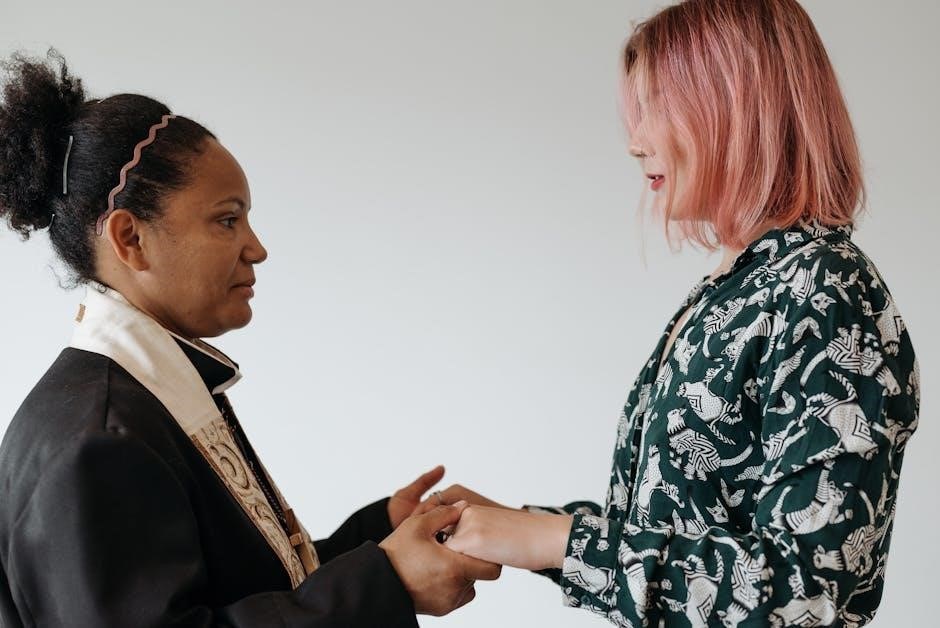The 9th Edition of Counseling the Culturally Diverse emphasizes cultural competence‚ social justice‚ and addressing barriers in cross-cultural settings‚ offering updated strategies for effective counseling practices.
1.1 Significance of the 9th Edition
The 9th Edition of Counseling the Culturally Diverse: Theory and Practice is a landmark resource that updates counselors on critical issues in multicultural counseling. It emphasizes the importance of cultural competence‚ social justice‚ and addressing systemic barriers. New chapters explore emerging topics such as cultural humility‚ the role of white allies‚ and minority stress. The edition also revises its theoretical frameworks to reflect contemporary understandings of diversity and inclusion. By integrating real-world case studies and practical strategies‚ it equips counselors with actionable tools for working with diverse populations. This edition is particularly significant for its focus on intersectionality and advocacy‚ making it indispensable for modern counseling practices.
1.2 Overview of the Book’s Structure
The 9th Edition of Counseling the Culturally Diverse: Theory and Practice is organized into six main sections‚ each addressing critical aspects of multicultural counseling. The book begins with an introduction to the field‚ followed by key concepts and theoretical foundations. It then progresses to practical applications‚ case studies‚ and advanced topics like intersectionality and social justice advocacy. The structure ensures a logical flow‚ from understanding cultural competence to implementing effective strategies in diverse settings. Each chapter builds on the previous one‚ providing a comprehensive framework for counselors to navigate cross-cultural challenges. The inclusion of real-world case studies‚ videos‚ and updated research makes the text both accessible and applicable for modern counseling practices.
Key Concepts in Multicultural Counseling
The 9th Edition explores cultural competence‚ cultural humility‚ and strategies to address barriers in cross-cultural settings‚ emphasizing the importance of understanding diverse worldviews and societal influences.
2.1 Understanding Cultural Competence
Cultural competence is a foundational concept in multicultural counseling‚ involving counselors’ awareness of their own cultural biases and the ability to understand and respect diverse client worldviews. The 9th Edition highlights the importance of cultural humility and the need for ongoing self-reflection. It emphasizes acquiring knowledge about diverse cultural groups and developing skills to adapt interventions to meet clients’ unique needs. Authors Derald Wing Sue and colleagues stress that cultural competence is not a static state but a continuous process of learning and growth. This chapter provides practical strategies for fostering cultural sensitivity and addressing power dynamics in the therapeutic relationship‚ ensuring equitable and effective counseling practices across diverse populations.

2.2 Overcoming Barriers in Cross-Cultural Counseling
Effective cross-cultural counseling requires addressing systemic and interpersonal barriers that hinder therapeutic progress. The 9th Edition identifies language differences‚ cultural biases‚ and power imbalances as significant obstacles. Counselors must recognize and navigate these challenges to build trust and rapport with diverse clients. Strategies such as active listening‚ cultural humility‚ and incorporating clients’ indigenous healing practices are emphasized. Additionally‚ the text highlights the importance of self-reflection and awareness of one’s own cultural identity to avoid imposing dominant cultural values. By acknowledging and addressing these barriers‚ counselors can create a safer‚ more inclusive therapeutic environment‚ fostering empowerment and resilience in diverse populations. This chapter provides practical tools and frameworks to enhance cross-cultural communication and collaboration.

Theoretical Foundations
The 9th Edition explores foundational theories underpinning multicultural counseling‚ including the Multicultural Counseling Competence Model and the role of societal culture in shaping client experiences and therapeutic approaches.
Key theories emphasize cultural identity development‚ acculturation‚ and the impact of systemic oppression‚ providing a framework for understanding diverse client worldviews and promoting culturally responsive interventions.
3.1 The Multicultural Counseling Competence Model
The Multicultural Counseling Competence Model‚ a cornerstone of the 9th Edition‚ emphasizes three key components: cultural awareness‚ knowledge‚ and skills. This framework guides counselors in understanding their own biases and the client’s worldview‚ ensuring culturally responsive care. It highlights the importance of self-reflection and cultural humility‚ enabling counselors to navigate diverse client backgrounds effectively. The model also addresses systemic oppression and advocates for social justice‚ aligning with contemporary issues in multicultural counseling. By integrating these elements‚ the model provides a comprehensive approach to fostering inclusivity and equity in therapeutic settings‚ making it a vital tool for counselors working with diverse populations.
- Cultural awareness: Recognizing personal biases and the client’s cultural context.
- Cultural knowledge: Understanding diverse cultural practices and their impact on counseling.
- Cultural skills: Applying interventions tailored to the client’s unique needs.
3.2 The Role of Societal Culture in Counseling
Societal culture significantly influences counseling dynamics‚ shaping clients’ worldviews and counselors’ approaches. The 9th Edition highlights how cultural norms‚ values‚ and systemic inequities impact mental health and therapeutic relationships. It emphasizes understanding the interplay between societal expectations and individual experiences‚ particularly for marginalized groups. Counselors must recognize how societal culture can perpetuate biases and oppression‚ affecting clients’ access to resources and mental health outcomes. By addressing these factors‚ counselors can foster a more inclusive and equitable counseling environment. This section underscores the importance of cultural humility and advocacy in navigating societal influences that shape the counseling process.
- Cultural norms and values influence client behaviors and expectations.
- Societal inequities impact mental health and access to care.
- Cultural humility is essential for addressing systemic biases.

Practical Applications
The 9th Edition provides effective strategies for counseling diverse populations‚ including real-world examples and evidence-based interventions to address cultural barriers and promote mental health equity in practice.
4.1 Effective Strategies for Diverse Populations
The 9th Edition of Counseling the Culturally Diverse offers evidence-based strategies to enhance counseling effectiveness across diverse populations. It emphasizes cultural humility‚ active listening‚ and adapting interventions to clients’ unique cultural contexts. The book provides practical approaches for addressing barriers such as language differences‚ cultural mistrust‚ and societal oppression. Strategies include incorporating clients’ cultural values‚ beliefs‚ and worldviews into the counseling process. Additionally‚ the text highlights the importance of social justice advocacy and empowerment to promote equity and well-being. Real-world examples and case studies illustrate how these strategies can be applied in various settings‚ ensuring counselors are equipped to navigate complex multicultural scenarios effectively. By focusing on client-centered and culturally responsive practices‚ the book equips professionals with tools to foster meaningful change and inclusivity.
4.2 Case Studies in Multicultural Settings
The 9th Edition of Counseling the Culturally Diverse includes diverse case studies that illustrate real-world applications of multicultural counseling principles. These case studies explore various cultural contexts‚ such as racial identity‚ gender roles‚ and socioeconomic factors‚ providing insights into the complexities of cross-cultural interactions. Each case study highlights the importance of cultural competence and offers practical examples of how counselors can address unique client needs. By examining scenarios involving clients from different backgrounds‚ readers gain a deeper understanding of how to navigate challenges like cultural mistrust and communication barriers. These case studies also emphasize the role of self-reflection and cultural humility in building effective therapeutic relationships. They serve as invaluable tools for training counselors to work ethically and compassionately with diverse populations.
Advanced Topics
The 9th Edition explores advanced concepts like intersectionality and social justice advocacy‚ equipping counselors to address systemic inequities and promote inclusivity in diverse settings.
5.1 Intersectionality in Counseling
Intersectionality in counseling highlights the interconnected nature of clients’ identities‚ such as race‚ gender‚ class‚ and sexuality‚ which shape their experiences of oppression and privilege. The 9th Edition emphasizes understanding these intersections to provide culturally sensitive care. It explores how counselors can address the unique challenges faced by individuals with multiple marginalized identities. By integrating intersectionality‚ counselors can better acknowledge and validate clients’ lived experiences‚ fostering deeper trust and collaboration. The book provides practical strategies for applying intersectional frameworks in diverse settings‚ ensuring that counselors are equipped to address systemic inequities and promote social justice. This approach encourages counselors to move beyond single-issue perspectives‚ embracing a holistic understanding of client identities and experiences.
5.2 Social Justice Advocacy
Social justice advocacy is a cornerstone of multicultural counseling‚ emphasizing the counselor’s role in addressing systemic inequities and promoting fairness. The 9th Edition underscores the importance of counselors as advocates‚ working to dismantle oppressive systems and empower marginalized communities. It highlights the need for counselors to engage in advocacy at multiple levels—micro (individual)‚ meso (institutional)‚ and macro (societal). The book provides practical strategies for integrating social justice into practice‚ such as challenging biases‚ supporting policies that promote equity‚ and empowering clients to navigate oppressive environments. By advocating for social justice‚ counselors can help create a more inclusive and equitable society‚ aligning with the ethical mandate to address the broader sociopolitical contexts impacting clients’ lives.

Contemporary Issues
The 9th Edition explores emerging trends in multicultural counseling‚ addressing cultural humility‚ social justice‚ and minority stress. It highlights future directions for counselors in diverse‚ global settings.
6.1 Emerging Trends in Multicultural Counseling
The 9th Edition highlights emerging trends such as cultural humility‚ social justice advocacy‚ and addressing minority stress. It emphasizes the integration of non-Western healing practices and the impact of globalization on mental health. The book also explores the role of technology in expanding access to cross-cultural counseling‚ particularly through telehealth platforms. Additionally‚ it addresses the growing need for counselors to navigate intersectional identities and the mental health challenges posed by societal changes‚ such as immigration and political unrest. These trends underscore the importance of adaptability and ongoing education for counselors working in diverse‚ ever-evolving settings.
6.2 The Future of Culturally Diverse Counseling
The future of culturally diverse counseling lies in advancing cultural competence and integrating social justice advocacy into practice. The 9th Edition underscores the importance of adapting to global changes‚ such as migration and technological advancements‚ to meet the needs of diverse populations. Telehealth platforms are expected to play a pivotal role in expanding access to cross-cultural counseling‚ especially for marginalized communities. Additionally‚ the integration of non-Western healing practices and a focus on intersectional identities will shape the field. Training programs will emphasize cultural humility and ongoing education to prepare counselors for evolving societal challenges. By prioritizing equity and inclusivity‚ the future of culturally diverse counseling promises to be more effective and compassionate.
